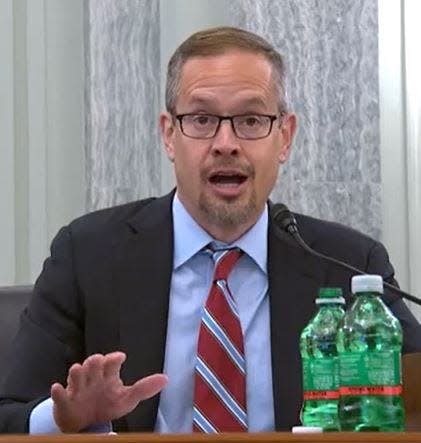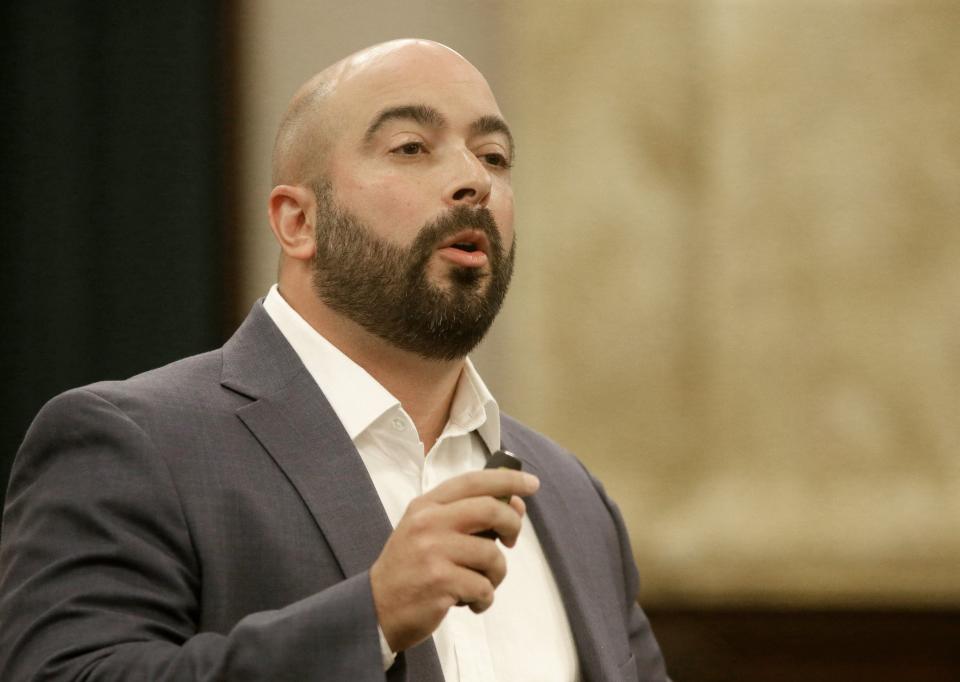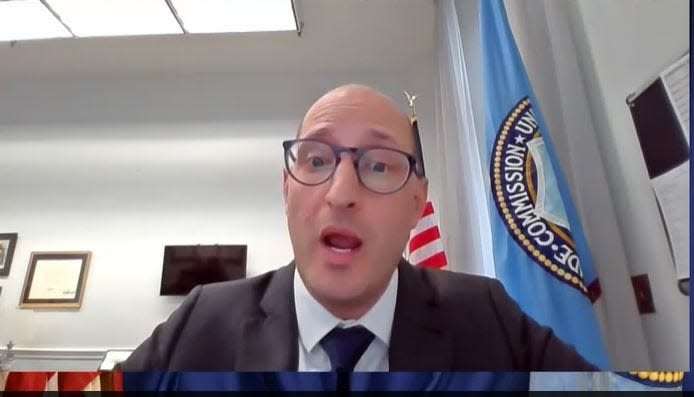FTC agrees to 'shine a light' on how drug middlemen impact your prescription prices

In a move strongly advocated by critics of middlemen in the U.S. drug supply chain, the Federal Trade Commission unanimously agreed to conduct an in-depth probe of pharmacy benefit managers.
"Given that PBMs’ practices can have life-and-death consequences for Americans, the FTC has a moral imperative to act with urgency on this issue," said FTC Chair Lina M. Khan after the private decision Monday was made public Tuesday afternoon.
“Although many people have never heard of pharmacy benefit managers, these powerful middlemen have enormous influence over the U.S. prescription drug system,” Khan said.
Scott Knoer, a pharmacy executive who formerly headed Cleveland Clinic's pharmacy, said, "Hopefully the FTC shining a light on the dark underbelly of the anticompetitive PBM oligarchy is the beginning of the end for these middlemen who have made immense profit on the backs of patients and taxpayers while forcing pharmacies to close in underserved areas. Break em up!"
The trade commission had deadlocked 2-2 in February on a proposed PBM probe. But continued pressure by pharmacy advocates and members of Congress – as well as the prospect of President Joe Biden appointee Alvaro Bedoya filling the five-member commission's vacancy to break the tie – increased prospects the FTC eventually would launch an in-depth study.
The agency received more than 24,000 public comments on the proposed study, most bashing the behavior of PBMs. "These examples made a difference," said Doug Hoey, CEO of the National Community Pharmacists Association, which represents more than 22,000 pharmacies.
.@RPhDouglas: NCPA repeatedly called on FTC to scrutinize PBM practices and thousands of community pharmacy owners and allies shared the impact health insurer-owned PBMs have on costs and access. These examples made a difference. https://t.co/hZKGzGlSHq https://t.co/8jnDfnx15Q
— NCPA (@Commpharmacy) June 7, 2022
After the FTC's 5-0 vote, Bedoya, who was confirmed May 11, stressed that the secretive PBMs make an extensive impact on almost everyone's life.
"Nearly everyone is affected by PBM business practices. For most Americans, pharmacy middlemen control what medicine you get, how you get it, when you get it, and how much you pay for it. Yet PBM practices are cloaked in secrecy, opacity, and almost impenetrable complexity," Bedoya said.

'Tremendous opportunity' to expose warped incentives driving drug prices
The head of the PBMs' trade group, Pharmaceutical Care Management Association President and CEO J.C. Scott, said he is "confident that any examination of pharmacy benefit managers, PBMs, will validate that PBMs are reducing prescription drug costs for consumers. PBMs are the only member of the prescription drug supply and payment chain working to lower drug costs."
Scott expressed disappointment that the FTC decided not to study the entire supply chain of prescription drugs.
Ohio Democratic Sen. Sherrod Brown, one of numerous bipartisan federal lawmakers urging FTC action, said, “This reform is long overdue to save Ohioans money at the pharmacy and support Ohio’s community pharmacies. It’s why for years I’ve pushed for a crackdown on these abusive fees by corporate middlemen, and this is the first administration that’s taken any real action to get the job done."

A longstanding critic of PBMs, Ohio drug analyst Antonio Ciaccia, said, "As federal officials continue to grapple with ways to reduce prescription drug costs for consumers, an FTC investigation into the hyper-consolidated and vertically integrated PBM industry is a tremendous opportunity to expose many of the warped incentives and purposeful opacity that exacerbates American drug pricing dysfunction."
FTC member Rebecca Kelly Slaughter remarked that she was particularly encouraged the study will investigate the urgent problems Americans have encountered in accessing and paying for insulin.
"Insulin patients have been vocal about the cripplingly high cost of insulin—a heightened burden for patients with high-deductible insurance plans or no insurance at all," she said.

"The grave consequences of these apparent distortions in insulin markets subject patients to insulin rationing and can lead to permanent, even fatal consequences," she added. "More disturbingly, because diabetes disproportionately affects lower income communities and communities of color, problems in insulin markets also exacerbate disparities in health equity."
FTC members Noah Joshua Phillips and Christine S. Wilson, who voted against the study in February, explained in a joint statement they deemed the earlier proposal "neither comprehensive nor rigorous." They said it "failed even to examine the topic the agency announced on its website at that time – the competitive impact of PBM contracting practices. It omitted a number of matters raised by proponents of issuing the study, including the impact upon consumers."


The duo added: "This one is different. ... It is scoped to study the competitive impact of PBM practices, including – critically – how those practices might impact out-of-pocket costs for consumers."
What information must PBMs provide to the Federal Trade Commission?
The FTC's investigation, called a 6(b) study after the section of the law that authorizes it, will scrutinize the impact of vertically integrated PBMs – so labeled because the conglomerates that own PBMs also own health insurers, retail drug outlets and other health care entities – on the access and affordability of prescription drugs.
Six PBMs will get FTC orders to turn over a raft of information within 90 days: CVS Caremark; Express Scripts; OptumRx.; Humana; Prime Therapeutics; and MedImpact Healthcare Systems.
The first three — who are among the 15 largest companies in the U.S. — together control about 80% of the market. The companies are hired to negotiate rebates and fees with drug manufacturers, create drug formularies used by health insurers to determine, which medication gets covered, and reimburse pharmacies for patients’ prescriptions.

“This study will shine a light on these companies’ practices and their impact on pharmacies, payers, doctors, and patients," Kahn said. "As drug prices have soared and independent pharmacies have shuttered, scrutinizing the practices of PBMs is more critical than ever."
1. FTC has voted to order the six largest pharmacy benefit managers (PBMs) to produce documents and data as part of an inquiry into PBMs and their impact on patients, pharmacies, payers, and doctors.https://t.co/YmRoV8SZil
— Lina Khan (@linakhanFTC) June 7, 2022
The FTC inquiry targets several PBM tactics that have drawn scrutiny in recent years – virtually all of which have been detailed in dozens of Dispatch stories over the past four years – including:
• Charging unexplained fees and clawbacks – mysterious charges charged weeks to month after a prescription has been fille – to pharmacies unaffiliated with a PBM.
• Steering patients to PBM-owned pharmacies.
• Conducting potentially unfair audits of independent pharmacies.
• Using complicated, opaque methods to determine pharmacy reimbursement.
• Mandating prior authorizations and other administrative restrictions.
• Defining specialty drugs and specifying how they can be used.
• Collecting huge rebates and fees from drug manufacturers on formulary design and the costs of prescription drugs to payers and patients.
drowland@dispatch.com
@darreldrowland
Get more political analysis by listening to the Ohio Politics Explained podcast
This article originally appeared on The Columbus Dispatch: Prescription prices in fed scrutiny over drug middlemen
